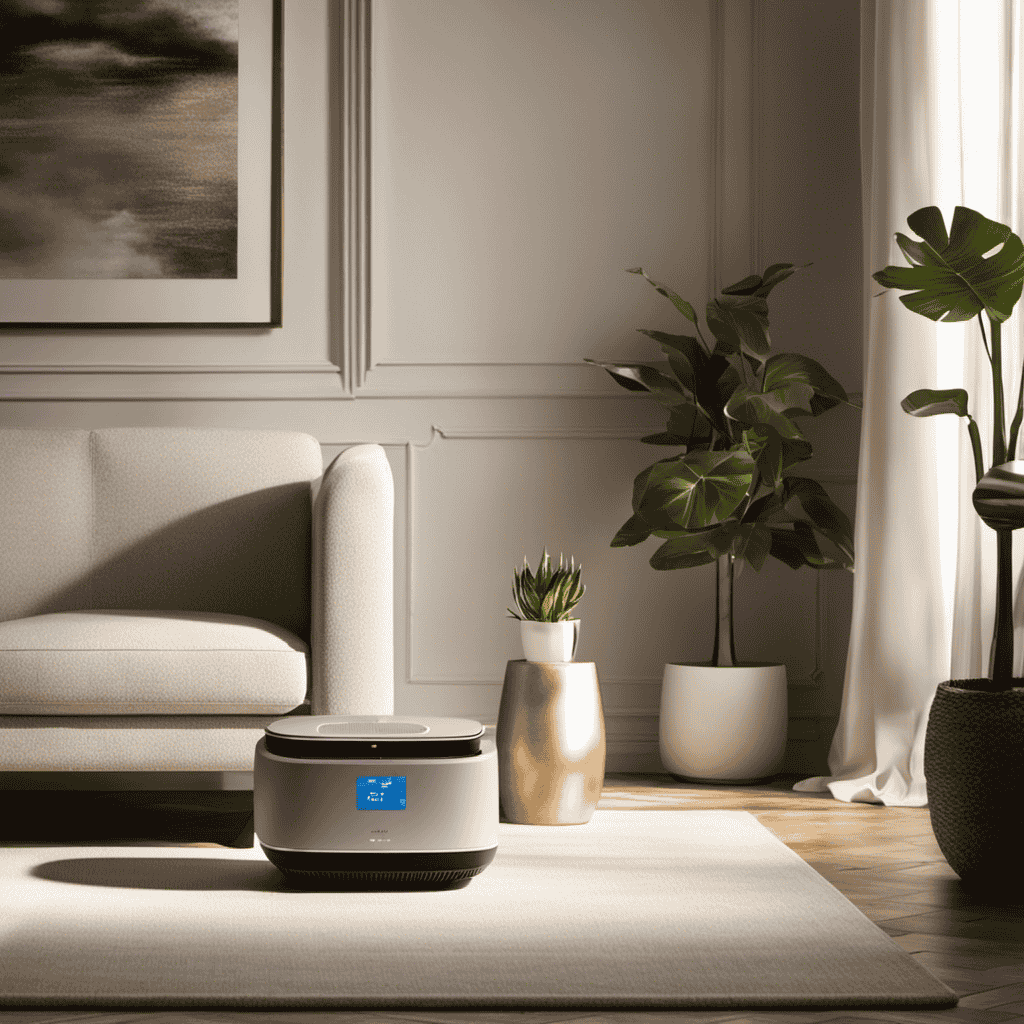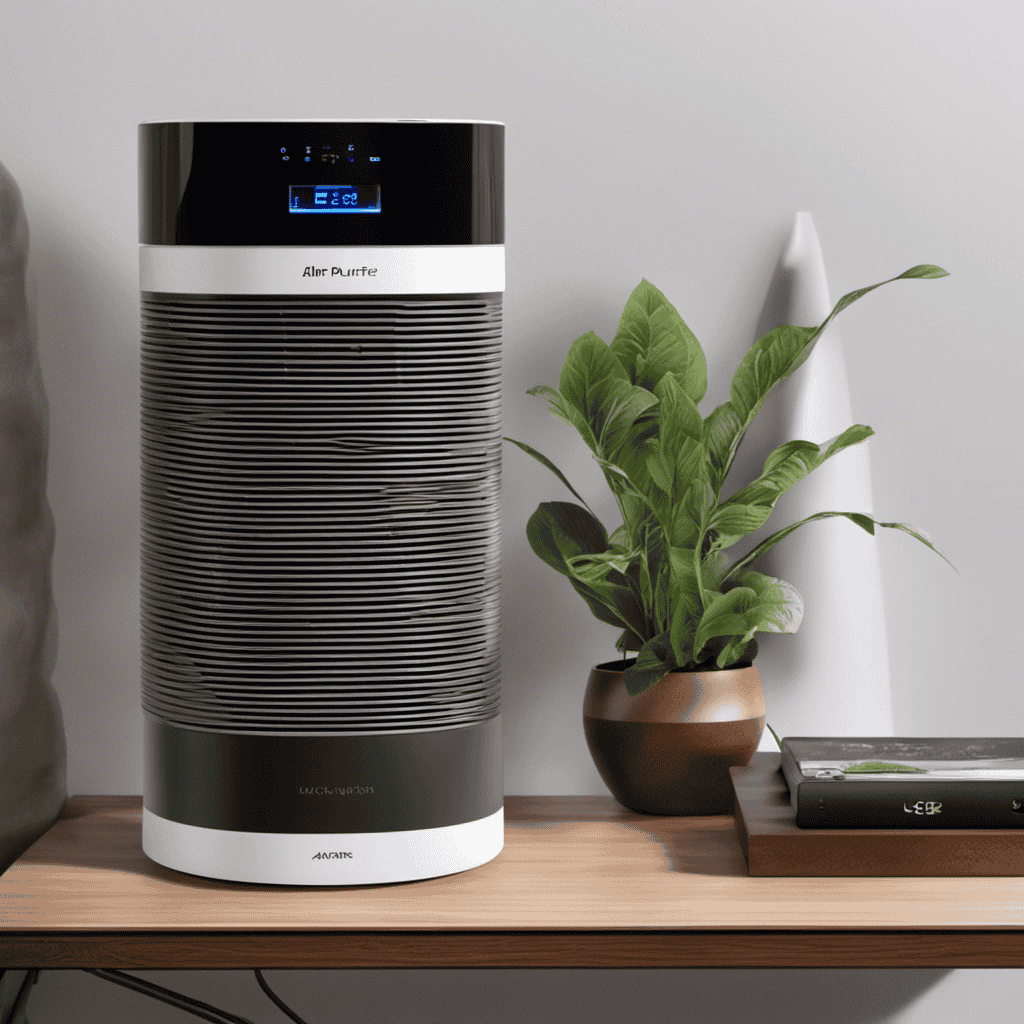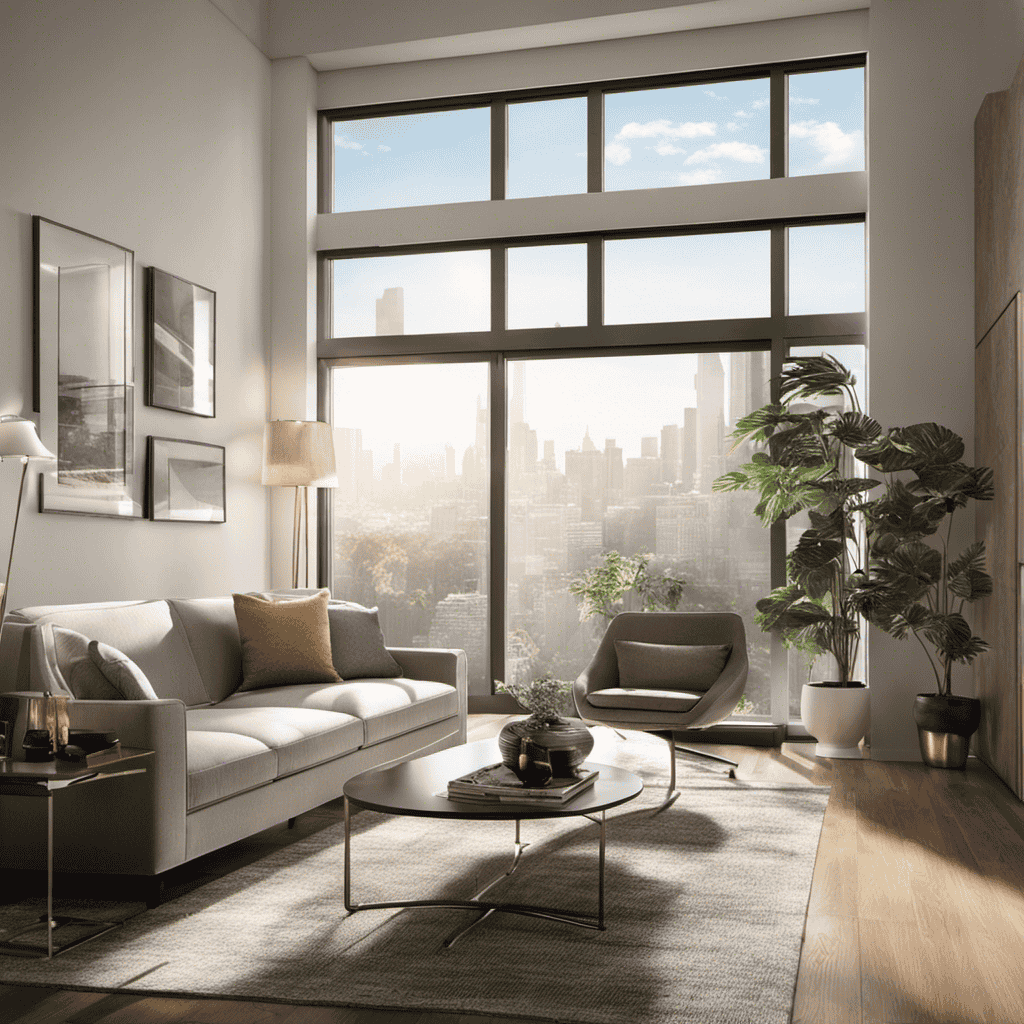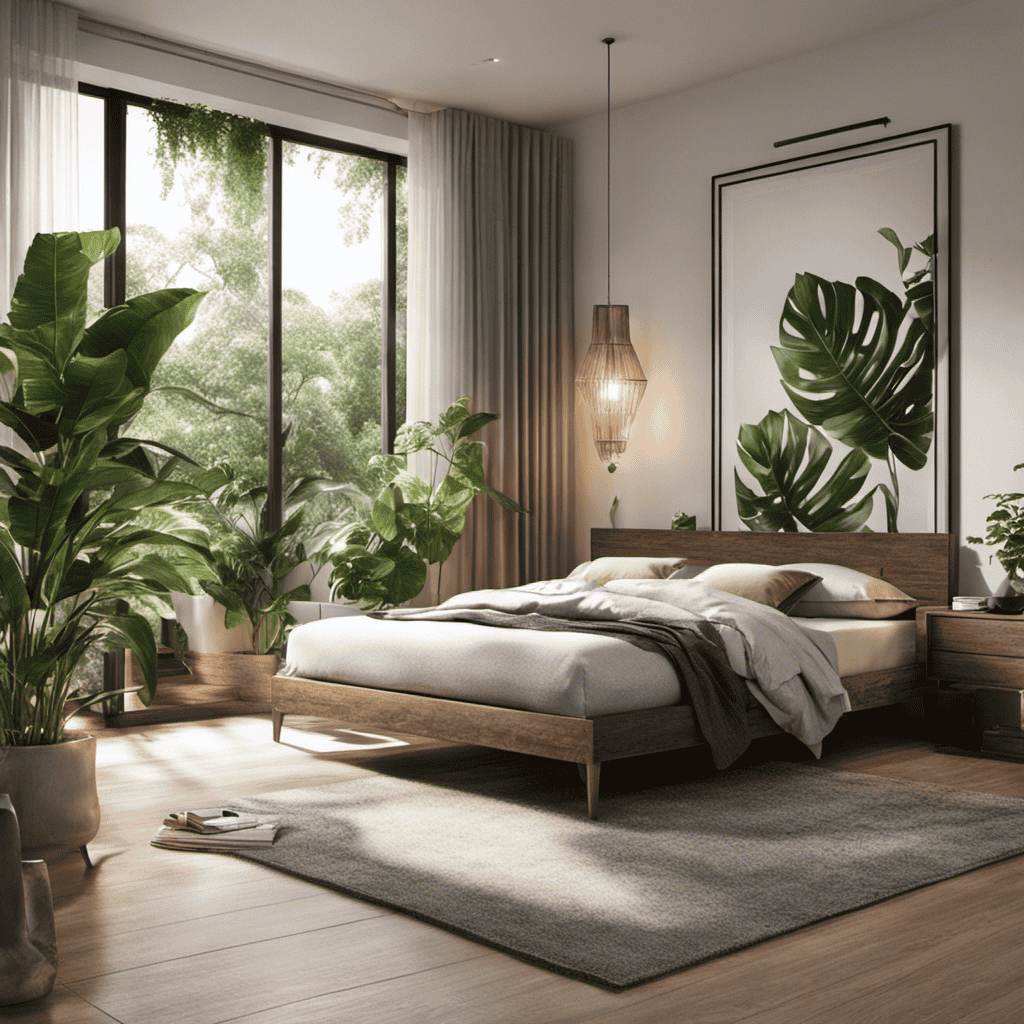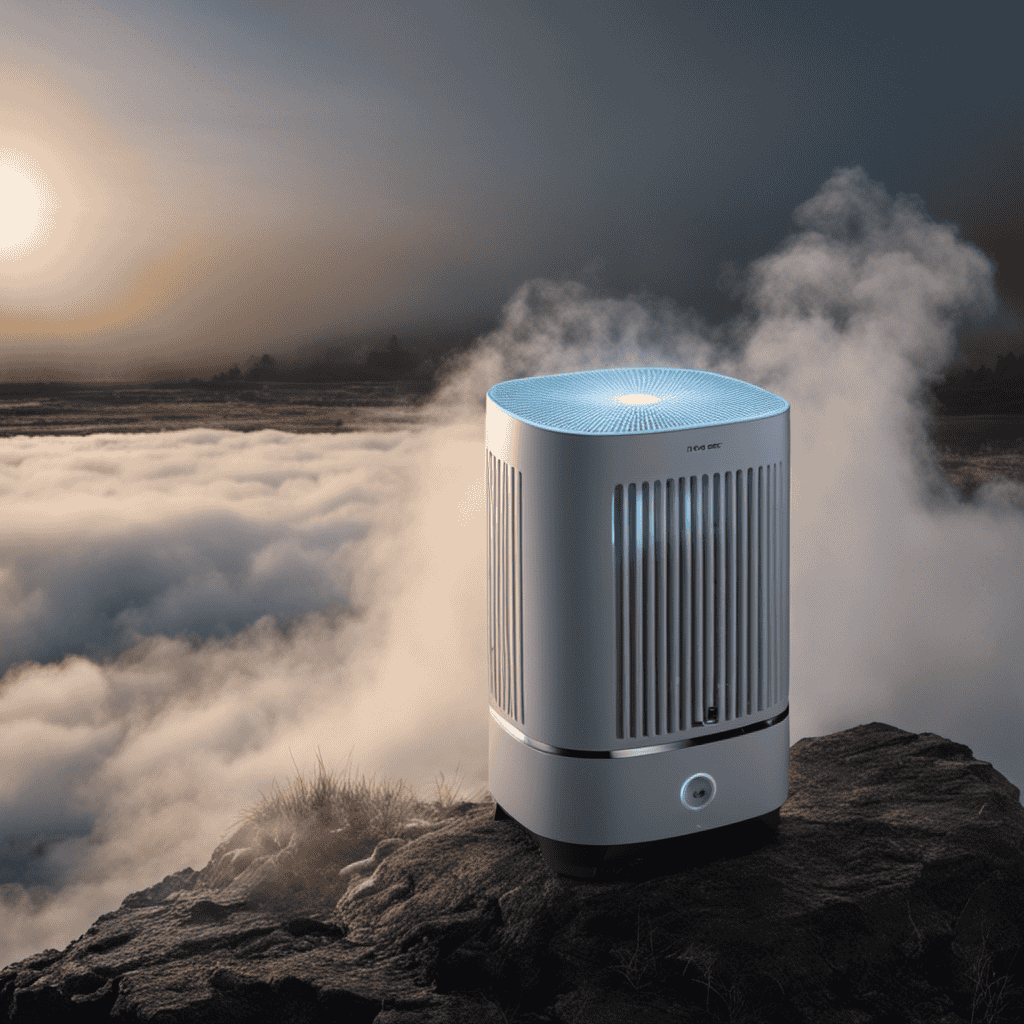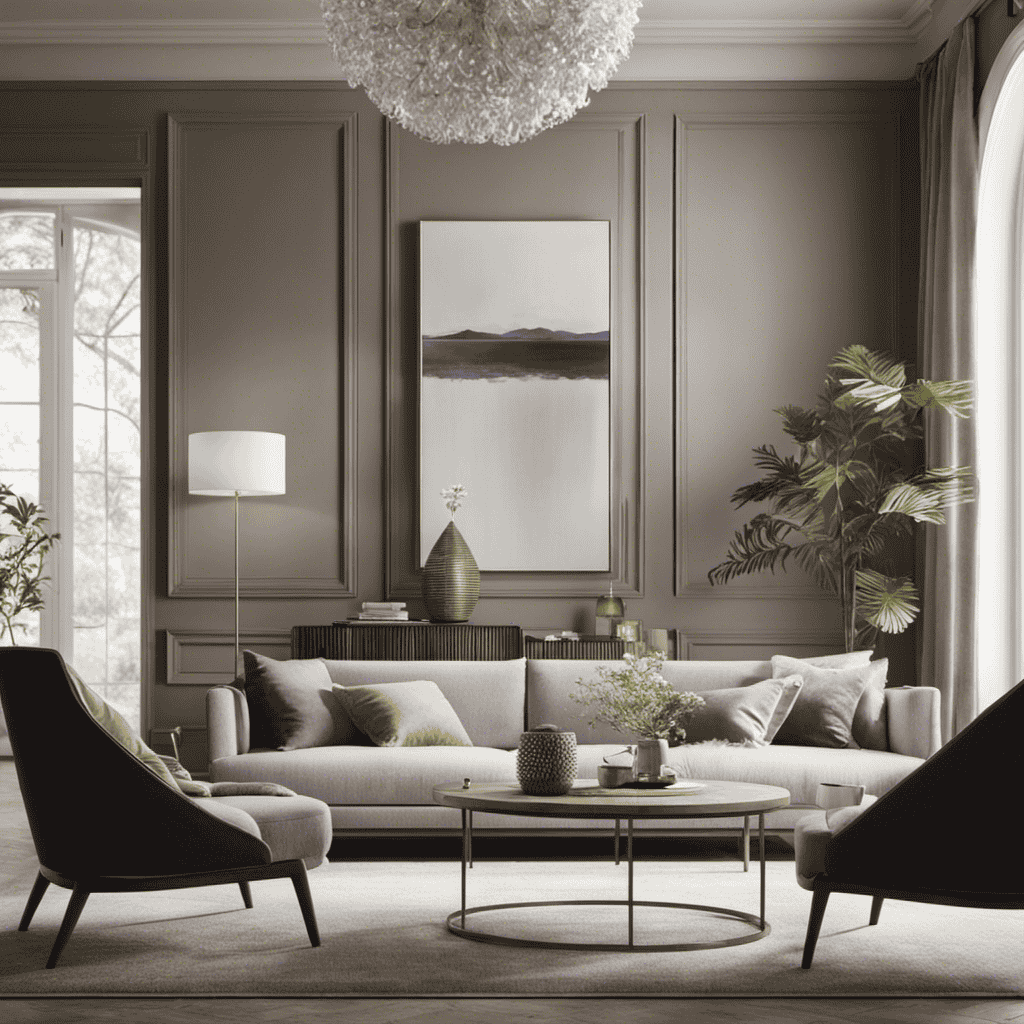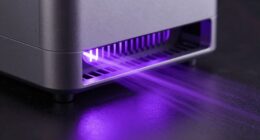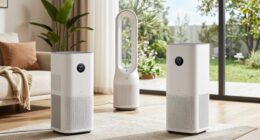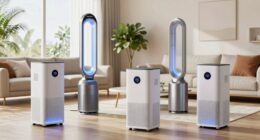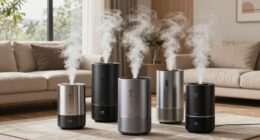As a person who appreciates clean and fresh air in their home, I frequently ponder, ‘How long should I keep my air purifier running?’ This is a common question that many of us have pondered, and it is crucial to strike the right balance.
Through my own experiences and research, I’ve discovered key factors to consider, such as room dimensions, air quality levels, and individual sensitivities. By understanding these factors, we can confidently determine the optimal operating time for our air purifiers, ensuring a healthier and more comfortable living space.
Key Takeaways
- Proper air purifier maintenance, including regular cleaning and filter replacement, is crucial for optimal performance and longevity.
- It is recommended to have your air purifier on for at least 8 hours a day for maximum effectiveness, but the optimal operating time can vary depending on factors such as room size, air quality, and specific needs.
- Consider running the purifier for longer periods if you live in an area with high pollution or have respiratory issues, but balance the need for clean air with energy consumption.
- The size of the purifier should be appropriate for the size of the room you want to purify, and regular maintenance is important to maintain its effectiveness.
Factors to Consider
There are several factors you should consider when deciding how long to have your air purifier on. Proper air purifier maintenance is crucial to ensure its optimal performance and longevity. Regularly cleaning or replacing the filters is essential to keep the purifier working efficiently. Neglecting this maintenance can lead to decreased effectiveness and increased energy consumption, which can impact the overall cost effectiveness of your air purifier.
Additionally, the air quality in your environment and the specific needs of your household should be taken into account. If you live in an area with high pollution or have respiratory issues, it might be beneficial to run the purifier for longer periods. Balancing the need for clean air with energy consumption is key.
Now, let’s move on to the recommended operating time for air purifiers.
Recommended Operating Time
When it comes to determining the optimal duration for operating an air purifier, there are a few key factors to consider.
These factors can greatly influence how long you should have your air purifier on for maximum effectiveness.
Optimal Air Purifier Duration
To maximize effectiveness, it’s recommended to have your air purifier on for at least 8 hours a day. This duration allows the purifier to continuously filter the air, ensuring that pollutants are effectively removed. However, it’s important to note that the optimal air purifier duration can vary depending on certain factors.
When considering the recommended duration for operating your air purifier, it’s crucial to also prioritize regular maintenance. This includes cleaning or replacing filters as needed, which can affect the purifier’s performance and lifespan. Neglecting maintenance can result in reduced efficiency and overall effectiveness of the purifier.
Factors such as room size, air quality, and specific needs can influence the operating time of your air purifier. These factors will be discussed in the subsequent section, shedding light on how to determine the appropriate duration for your specific circumstances.
Factors Affecting Operating Time
Take into account factors such as room size, air quality, and specific needs when determining how long to run your air purifier.
Purifier maintenance is an important aspect to consider. Regularly cleaning or replacing the filters ensures optimal performance and prolongs the lifespan of your unit. Neglecting maintenance can lead to poor air purification and reduced efficiency.
Additionally, consider the noise level of your air purifier. Some models can be quite loud, which may be disruptive in certain environments such as bedrooms or offices. If noise is a concern, you may want to run the purifier for shorter periods or use a quieter model.
Now that we have discussed the factors affecting operating time, let’s move on to the next section about purifier size and room dimensions.
Purifier Size and Room Dimensions
When it comes to choosing an air purifier, there are a few key points to consider.
Firstly, the effectiveness of an air purifier is determined by its ability to remove pollutants from the air.
Secondly, the size of the purifier should be appropriate for the size of the room you want to purify.
Lastly, the optimal run time of the device should be considered to ensure maximum air purification without wasting energy.
As an experienced air quality specialist, I can provide valuable insights on these factors to help you make an informed decision.
Purifier Effectiveness and Size
The effectiveness of your air purifier may vary depending on its size and the specific needs of your space. When it comes to purifier effectiveness, there are a few key factors to consider.
-
Size of the purifier:
Larger purifiers are generally more effective in larger spaces as they can cover a larger area and circulate more air.
Smaller purifiers are suitable for smaller spaces or for targeting specific areas within a room. -
Specific needs of your space:
Consider the level of air pollution in your area. If you live in a highly polluted area, you may need a more powerful purifier.
Consider any specific allergens or contaminants you want to target. Some purifiers are designed to be more effective at removing certain pollutants.
To maintain the effectiveness of your air purifier, regular maintenance is crucial. This includes cleaning the filters and replacing them when necessary. Filter replacement is important as dirty or clogged filters can hinder the purifier’s performance. Follow the manufacturer’s guidelines for filter replacement to ensure optimal air purification.
Room Size Considerations
Consider the size of your room when choosing an air purifier. The room layout plays a crucial role in determining the effectiveness of the purifier.
As an experienced and knowledgeable expert in the field, I can confidently say that selecting the right size is essential for optimal air purification. A smaller room would require a compact air purifier, while a larger space would demand a more powerful unit.
Additionally, noise levels should also be taken into consideration. No one wants a purifier that disrupts their peaceful environment. Therefore, it is important to choose a purifier with noise levels that are acceptable for your specific needs.
Optimal Run Time
To achieve the best results, it’s important to determine the ideal amount of time to run your air purifier. Finding the recommended run time for your specific needs can greatly improve the air quality in your home. Here are a few factors to consider:
-
Room size: Larger rooms may require longer run times to effectively purify the air, while smaller rooms may only need shorter intervals.
-
Allergies or asthma: If you or someone in your household suffers from allergies or asthma, it’s recommended to run the air purifier continuously or for longer periods to provide constant relief.
When it comes to purifier maintenance, keep in mind these tips:
-
Regular filter replacement: Check the manufacturer’s guidelines for filter replacement frequency to ensure optimal performance.
-
Cleaning: Regularly clean the exterior and interior components of the air purifier to prevent dust and debris buildup.
Air Quality Levels
You should check the air quality levels in your area before deciding how long to have your air purifier on. Air pollution can have serious health effects, so it’s important to be aware of the quality of the air you breathe.
By checking the air quality levels, you can determine if there are any pollutants present that may require you to run your air purifier for longer periods of time. High levels of pollutants such as particulate matter, volatile organic compounds, and allergens can negatively impact your health, especially if you have respiratory issues or allergies.
Allergies and Sensitivities
If you have allergies or sensitivities, it’s crucial to be aware of the air quality in your area. As someone who has dealt with allergies for years, I understand the importance of keeping your indoor air clean and free from allergens.
There are a few key factors to consider when it comes to allergies and sensitivities:
-
Furniture allergies:
-
Upholstered furniture can harbor dust mites and mold, leading to allergic reactions.
-
Opt for furniture made of materials that are less likely to trigger allergies, such as leather or vinyl.
-
Pet dander:
-
Pets can be a major source of allergens, especially their dander.
-
Regularly grooming and bathing your pets can help reduce the amount of dander in your home.
Sleep and Nighttime Use
Having a comfortable mattress and pillow is essential for a good night’s sleep. Sleep quality plays a significant role in our overall health and well-being. When we prioritize our sleep and create a conducive environment for rest, we can experience numerous health benefits.
One way to enhance our sleep quality is by investing in a high-quality mattress and pillow. These should provide adequate support and comfort to ensure a restful night’s sleep. A comfortable mattress can alleviate pressure points and promote proper spinal alignment, while a suitable pillow can provide neck and head support.
To further emphasize the importance of sleep quality, let’s take a look at the following table:
| Sleep Quality | Health Benefits |
|---|---|
| Improved mood | Reduced risk of chronic diseases |
| Enhanced concentration and productivity | Strengthened immune system |
| Better memory and cognitive function | Healthy weight maintenance |
| Reduced stress and anxiety | Improved cardiovascular health |
| Faster recovery and healing | Enhanced overall well-being |
As an experienced sleep enthusiast, I can attest to the transformative power of a good night’s sleep. Prioritizing sleep quality and investing in a comfortable mattress and pillow can have a profound impact on our health and daily life. So, let’s prioritize our sleep and reap the countless benefits it offers.
High Traffic Areas
In high traffic areas, it’s important to regularly clean and maintain the floors to prevent dirt and debris from accumulating. This not only keeps the space looking clean and presentable, but also helps maintain good indoor air quality.
However, even with regular cleaning, it can be challenging to keep the air free from pollutants, especially in areas with high foot traffic. This is where air purifiers come in handy. By utilizing air purifiers in these areas, you can effectively reduce airborne pollutants and allergens, promoting a healthier environment.
When it comes to air purifier maintenance, it’s crucial to clean or replace the filters regularly to ensure optimal performance. Additionally, consider the noise levels of the air purifiers, especially in high traffic areas where a quieter operation is desired.
Now, let’s delve into the next section about odor control.
Odor Control
When it comes to reducing odors in high traffic areas, regular cleaning and proper ventilation are key. However, sometimes these measures may not be enough to completely eliminate unwanted smells. That’s where an air purifier can come in handy. Air purifiers are designed to remove pollutants, allergens, and odors from the air, creating a cleaner and fresher environment. But just like any other appliance, air purifiers require maintenance to ensure optimal performance. One important aspect of air purifier maintenance is filter replacement. Over time, the filters in your air purifier can become clogged with particles and lose their effectiveness. It is recommended to check and replace the filters according to the manufacturer’s instructions. By keeping up with air purifier maintenance, including regular filter replacement, you can ensure that your air purifier continues to effectively control odors in high traffic areas.
| Reason | Importance | Frequency |
|---|---|---|
| 1. Clean filters | Ensures optimal performance | Every 3-6 months |
| 2. Eliminate odors | Creates a fresh environment | As needed |
| 3. Prevent clogging | Improves air purifier efficiency | Every 3-6 months |
Energy Efficiency
One way to ensure energy efficiency is by regularly cleaning and replacing the filters in your air purifier. By doing this, you can improve the overall performance of your purifier and reduce its energy consumption.
Here are some tips to help you maintain the energy efficiency of your air purifier:
- Clean or replace the filters at least once every three months to prevent the build-up of dirt and debris.
- Consider using a HEPA filter, which can capture smaller particles and improve the air quality in your home.
- Keep the air purifier in a well-ventilated area to prevent it from working harder than necessary.
- Check the noise level of your purifier and make sure it is not too loud. Excessive noise can indicate a problem with the motor or fan, which can affect its energy efficiency.
Frequently Asked Questions
Can I Leave My Air Purifier on All Day and Night?
I leave my air purifier on all day and night for continuous operation. However, it’s important to consider energy consumption. It’s best to check the manufacturer’s recommendations to ensure optimal usage and efficiency.
How Do I Know if My Air Purifier Is the Right Size for My Room?
When it comes to air purifiers, size matters. Using an air purifier size calculator can help determine the right fit for your room. Enjoy the benefits of clean air with the right-sized purifier.
What Are the Different Air Quality Levels and How Do They Affect the Operation of an Air Purifier?
When it comes to air quality levels and their impact on air purifier operation, it’s important to consider the air quality index and the potential health risks associated with different air pollutants.
Can an Air Purifier Help With Specific Allergies or Sensitivities?
Having an air purifier can greatly benefit those with specific allergies or sensitivities. It helps remove allergens and pollutants from the air, providing a cleaner and healthier environment. Regular maintenance is important for optimal performance.
Is It Better to Use an Air Purifier During Sleep and Nighttime or During the Day in High Traffic Areas?
During sleep, it’s best to have the air purifier on in the bedroom to ensure clean air throughout the night. For high traffic areas, having it on during the day helps to continuously filter the air.
Conclusion
Well, my friends, after delving into the world of air purifiers and exploring the factors to consider, I must say that the question of how long to have your air purifier on is quite the conundrum.
But fear not, for I have come to the rescue with some expert advice. It seems that there is no one-size-fits-all answer, as it depends on various factors such as room size, air quality, and personal sensitivities.
However, rest assured that running your purifier for a few hours a day should suffice in most cases.
Ah, the joys of clean air!
